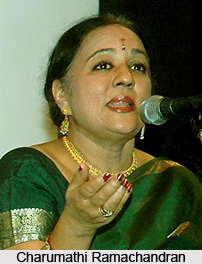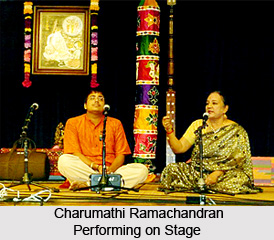 Charumathi Ramachandran is a Carnatic music vocalist who is the senior most disciple of Dr. M.L. Vasanthakumari. Later on she has also received training under Sri D.K. Jayaraman and Ramnad Krishnan. T. Brinda has taught the nuances of Veena to her. Charumathi Ramachandran has been attributed with a mellifluous voice. Her style of presentation has been considered as the epitome of classicism combining creative and adventurous artistry. She is the first Carnatic vocalist who introduced Hindustani forms in her music. Ramachandran has received training from the legendary persona of Carnatic music. She possesses mastery over a huge range of repertoire of traditional Kritis, Varnams, Darus and Sahitya Bhava. Enunciation that she holds in any language has been considered as perfect.
Charumathi Ramachandran is a Carnatic music vocalist who is the senior most disciple of Dr. M.L. Vasanthakumari. Later on she has also received training under Sri D.K. Jayaraman and Ramnad Krishnan. T. Brinda has taught the nuances of Veena to her. Charumathi Ramachandran has been attributed with a mellifluous voice. Her style of presentation has been considered as the epitome of classicism combining creative and adventurous artistry. She is the first Carnatic vocalist who introduced Hindustani forms in her music. Ramachandran has received training from the legendary persona of Carnatic music. She possesses mastery over a huge range of repertoire of traditional Kritis, Varnams, Darus and Sahitya Bhava. Enunciation that she holds in any language has been considered as perfect.
Early Life of Charumathi Ramachandran
Charumathi Ramachandran was born on 12th July 1951. Being a gold medallist, she stood first in music from the Madras University.
Career of Charumathi Ramachandran
Charumathi Ramachandran holds a strong clench in Laya artistry and Kaala Pramana. This has been exhibited in her performance of Neraval, Swaram and Pallavi singing. She, through her singing, tries to restore the life of Pallavi singing that has been almost died out. Comparatively toughest Pallavis in rare Thalas has been composed by Ramachandran by which she is attempted to popularize the Pallavi. She has created a number of songs to her credit. Om Namo Narayana - A lyric of Ambujam Krishna is considered to be most famous of all these. The beautiful Karnaranjani is a super hit amongst the noted and aspiring singers and music lovers. This has been created and presented by Ramachandran. Darus and Taranas have also been composed by her.

Charumathi Ramachandran has been reckoned as the first Carnatic musician, who has introduced the Hindustani form of Tarana in her concerts. She has done this task in a very appreciable way. For a number of stage shows and cassettes, Charumathi Ramachandran has done the music direction and orchestration. The most notable in this regard is the Krishnamritha Tarangini.
Other Ventures of Charumathi Ramachandran
Charumathi Ramachandran has also established the Raaga Arts Foundation. The show, Sri Krishna Madhuri, an operatic presentation combining Music, Dance, Drama, and Videoscope, was the first production staged by this Foundation. This has been considered as the true revival of the opera form. In this production, Subhasri (her daughter) play-acted as Meera Bai and Ramachandran as Swati Tirunal. Many other singers and dancers have also participated in the production.
Ramachandran has been highly esteemed as a committed and uncompromising teacher whose disciples are already making waves in the realm of music. In order to execute her artistry, she has travelled to the countries like USA, UK, Australia, Singapore and other Countries as well. In the year 1994, as recognition to her expertise, Charumathi Ramachandran was conferred her first Award, the M.L.V. Award. This award has been presented to her by Telugu Academy.
Personal Life of Charumathi Ramachandran
Charumathi Ramachandran married renowned Carnatic vocalist, Trichur V. Ramachandran. The couple has a daughter named Subhasri, who is also a Carnatic music singer.




















